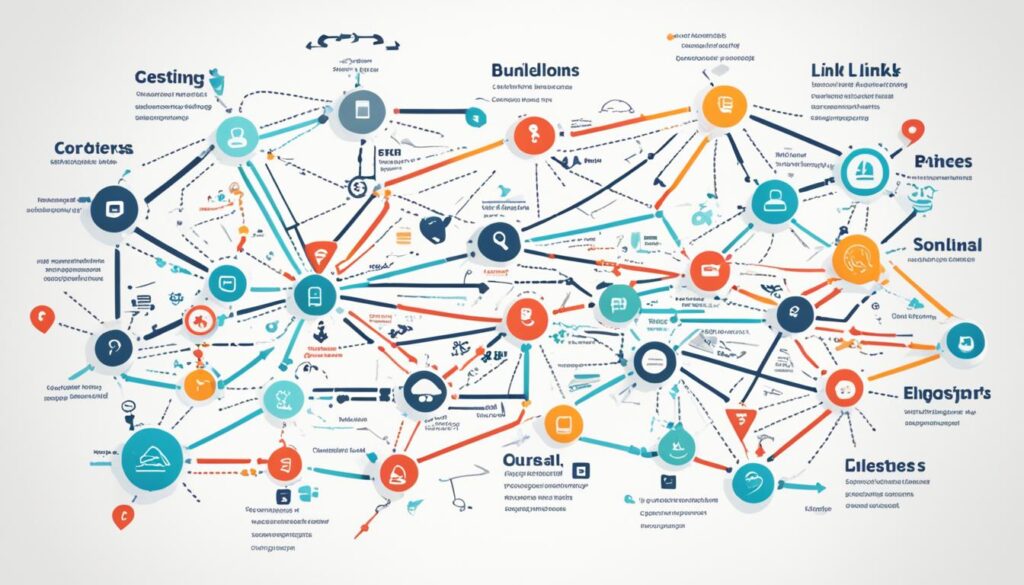Physical Address
304 North Cardinal St.
Dorchester Center, MA 02124
Physical Address
304 North Cardinal St.
Dorchester Center, MA 02124

Boost your website's visibility with these 5 SEO tips for bloggers and content creators: on-page optimization, keyword research, link building, content marketing, and mobile-friendliness.
Pages with video are 53 times more likely to hit Google’s first page. This shows how vital SEO is for bloggers and content creators. Bloggers make about 40% of their money from affiliate marketing. So, making your site easy to find on search engines is key.
Improving your blog for SEO takes time and work. Today, we’ll look at 5 great SEO tips for bloggers. They will help you rank better on search engines and grow your audience. These tips include creating evergreen content and making your site faster.
Using these tips can really boost your site in search results. It will bring more natural visitors and help you earn more. Let’s closely examine each tip to see how they can help you.
Evergreen content is key for a good content plan. It brings in visitors year after year by covering topics that stay popular long term.
Evergreen content stays fresh and useful to readers for a long time. It’s not like news that goes old fast; instead, it keeps bringing people to your site or blog.
“Where to buy furniture”, “How to make popcorn”, and “Places to stay in Bali” are great examples. People will always look for these topics, helping your content stay relevant.
Google Trends is a super tool for finding evergreen topics. By seeing how search interest changes over time, you can spot what topics people continue to care about. For example, the interest in “Places to stay in Bali” keeps going up. This makes it a top choice for a timeless travel blog post.
Starting with data, like search volumes and SEO competition, is smart. Look for what your audience wants by knowing their challenges and interests. Understand what products or services they need and what questions they ask the most.
Use Google, AnswerThePublic, and Exploding Topics to find hot topics. Also, mingle in online communities to grasp your audience’s interests. This insight guides you on what content to focus on.
Get a keyword and content list ready. Tools like Google Keyword Planner and Ubersuggest help find each topic’s search volume and SEO difficulty. With this info, you know what to tackle first.
Build a solid content plan with keyword research. This ensures your content resonates with your audience and stands out in searches. Such an approach is key in making your content strategy impactful.

Looking at the top SERP results is key before you start writing blogs. You need to understand why some pages are on top. This way, you can learn how to create content that does better. Seeing what works for others can help your blog succeed too.
When we look at what’s popular for a search like “Where to buy furniture,” we find common traits. The best blogs have:
Understanding successful content helps you improve your own. You can learn to write blogs that meet user needs and are enjoyable to read. The goal is to create high-quality, engaging blogs that really dive into a topic. Doing this can boost your blog above others in the SERPs.
Every blog post you write should add something meaningful for the reader. Ensure your content is both helpful and interesting. Aim for quality over quantity in your posts. Look at the top-ranked result for “best running shoes” to see what I mean. It’s detailed and shows the site is an expert. Plus, it’s easy to read, with short sentences and paragraphs. Google likes this depth. So, have at least 300 words in your posts. And keep them readable with short sentences and clear headings.
Create valuable and helpful content for your readers. This can make people stay longer on your site, which search engines notice. Good content can boost your site’s ranking and bring more visitors. Always focus on making high-quality posts, not just more of them.
Before you upload images to your website or blog, make them good for SEO. Give them clear file names and alt text with important keywords. Also, make the files smaller to help your page load faster. Good images can make your content stand out more.
When you work on images, make sure they add value for your readers. Focus on making a smooth, helpful experience. Search engines like this. Use alt text that truly tells what the image is about. Add in your important SEO-friendly images and image optimization keywords too.

Boosting your content’s visibility and search result ranks calls for effective on-page optimization. This means wisely placing your keywords in your web pages’ various parts. Add them in your title, headers, body, and meta tags. Using different header tags helps organize your text for both users and search engines.
Placing your keywords right in your content is key. Use them in the page’s title, subheadings, and text to show what your page is about. Also, don’t forget to add them to your meta descriptions and URLs. This boosts how many people click through to your page from search results.
Using correct header tags makes your page’s info clear. The H1 tag is for the main title. Use H2 and H3 for section and subheadings. This makes your page easy for users and search engines to understand.
Write catchy meta descriptions and have clear, keyword-rich URLs for better search results. Meta descriptions are like ads that appear below your page’s title in searches. By using your keywords here, you can attract more clicks. Also, keyword-focused URLs help search engines grasp your page’s theme better.
Link building is vital for SEO strategies. It increases your site’s authority and relevance. Both internal links and external links can boost your content’s presence in search results.
Linking between your site’s pages helps search engines understand your content better. It makes it easier for visitors to find related info on your site. Placing links wisely in your posts and pages improves your site’s overall quality.
Getting links to your site from other trusted sites shows search engines your site is valuable. To do this, use methods like guest posts and forming partnerships. These actions will enhance your site’s recognition over time.

Having a fast website is crucial for two big reasons. First, users like quick-loading pages. Second, Google gives better rankings to sites that load fast and work well on phones. So, to keep people on your site and lower the number of visitors who leave right away, you need to make your site faster.
Today, everyone wants websites to load in a snap. Google knows this, making website speed super important for your search rank. If your site loads slowly, people won’t stay long, which can hurt how well you do in search results.
Luckily, improving how fast your pages load isn’t impossible. There are several tricks you can use:
Use tools like Google PageSpeed Insights and GTMetrix to find where your site needs work. A faster site is not just good for Google. It also keeps your visitors happy and on your site longer.

It’s crucial to keep an eye on how your website is doing. Tracking and analyzing your site’s performance shows how well your SEO works. Google Analytics is a great tool for this. It gives you detailed info on your site’s visitors, their behavior, and more. You can see which parts of your site are doing great and which could be better.
Google Analytics is like a doctor for your website. It tells you where your traffic comes from and how people interact with your site. With these insights, you can plan your SEO better.
Looking at overall traffic is not enough. You need to check specific SEO metrics too. These include organic traffic, bounce rate, and time spent on pages. They help you understand how well your site is meeting its goals.
Edit your content and page elements based on this data. This will help your site do even better. Always look at your analytics regularly to improve your SEO’s impact.
Using these 5 SEO tips can boost your website’s popularity and visitor numbers. With a keen eye on making valuable, lasting content and careful keyword research, your site will stand out. Also, enhancing your page’s elements and connecting with other high-quality sites helps a lot.
It’s key to follow these steps consistently. This keeps your site high up in online searches naturally. Plus, keeping in touch with new SEO ideas and changes helps a bunch. With a smart SEO plan, you can attract more visitors, make them stay longer, and really build up your space online.
By weaving SEO insights into what you create and how you promote it, you’ll notice a huge difference. Your site will become more trusted and draw in the right type of people. Although SEO’s impact may take time to show, the benefits are big. These include more people finding your site, more folks recognizing your brand, and more chances to grow financially.